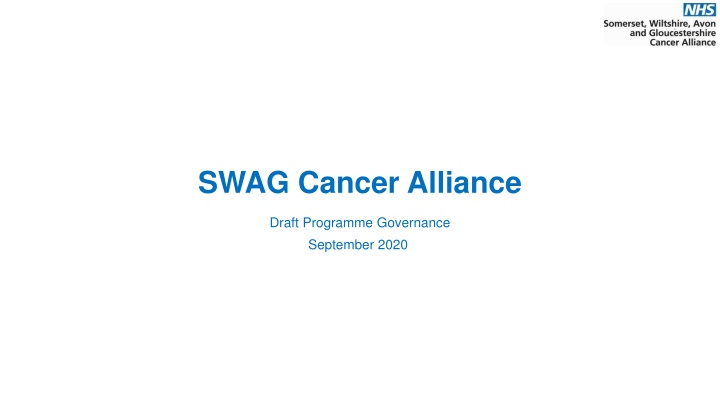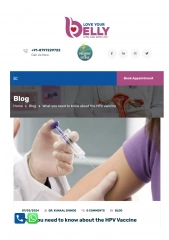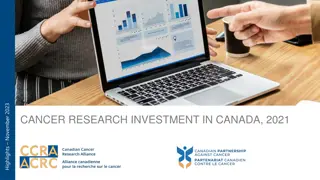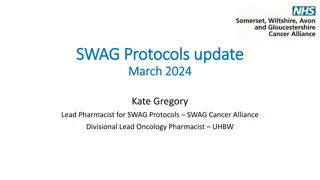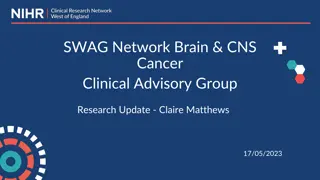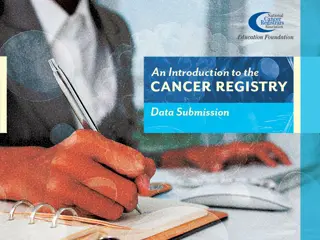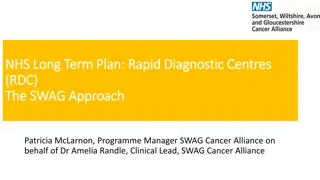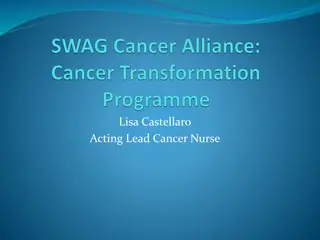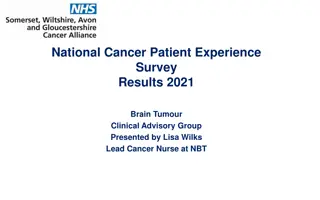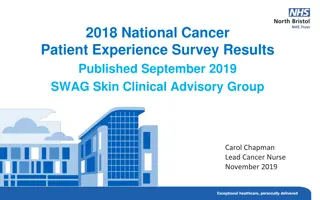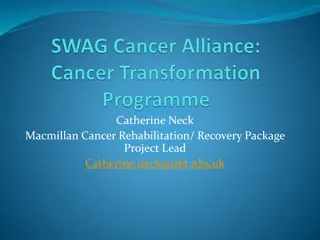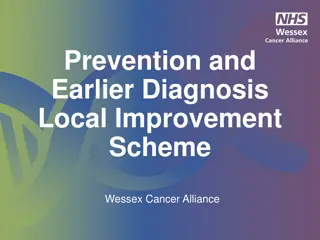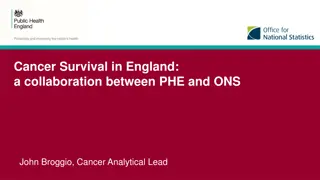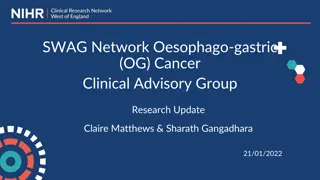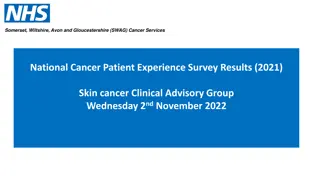SWAG Cancer Alliance
SWAG Cancer Alliance works to transform cancer care by bringing together leaders from various healthcare organizations to improve diagnosis, treatment, and patient care. The NHS Long Term Plan provides funding and guidance to support Cancer Alliances in delivering their commitments. This document outlines the background, context, and key roles within the Alliance to ensure effective governance and service delivery.
Download Presentation

Please find below an Image/Link to download the presentation.
The content on the website is provided AS IS for your information and personal use only. It may not be sold, licensed, or shared on other websites without obtaining consent from the author.If you encounter any issues during the download, it is possible that the publisher has removed the file from their server.
You are allowed to download the files provided on this website for personal or commercial use, subject to the condition that they are used lawfully. All files are the property of their respective owners.
The content on the website is provided AS IS for your information and personal use only. It may not be sold, licensed, or shared on other websites without obtaining consent from the author.
E N D
Presentation Transcript
SWAG Cancer Alliance Draft Programme Governance September 2020
Contents Background and Context SWAG Cancer Alliance Working across the Alliance APPENDIX Alliance Leadership Roles
Background and context Cancer Alliances Cancer Alliances: Cancer Alliances are defined by NHS England as: [B]ring[ing] together clinical and managerial leaders from different hospital trusts and other health and social care organisations, to transform the diagnosis, treatment and care for cancer patients in their local area. These partnerships enable care to be more planned across local cancer pathways. effectively In support of these ambitions, the NHS Long Term Plan Implementation Framework sets out that, 2023/24 over 400 million of additional funding will have been distributed to Cancer Alliances to support delivery of the Long Term Plan ambitions for cancer. Targeted funding will also be available to support the development and spread of innovative models of early identification of cancer. The NHS Long Term Plan describes a wide variety of commitments for cancer that Cancer Alliances should support delivery of. These commitments fall broadly into two categories; Transformation and Operational Delivery . Operational Delivery refers to the Alliance s role in performance, where as Transformation refers to their role in service improvement and innovation. Relationship between Cancer Alliances and Sustainability and Transformation Partnerships (STPs) National guidance makes clear that that local systems should engage with their Cancer Alliances to set out how they will deliver the Long Term Plan commitments for cancer. As part of this, it is expected that Cancer Alliances will work increasingly closely with their STPs and emerging Integrated Care Systems (ICSs). For example, the NHS Operational Planning and Contracting Guidance for 2019/20 states that: Cancer Alliances provide clinical, operational and transformational leadership to their local cancer system by bringing together their constituent commissioners and providers, STPs/ICSs, to ensure system-wide oversight and transformation of cancer services and outcomes . (emphasis added) on behalf of their
Background and context SWAG Cancer Alliances National 2019/20 Planning) also specifies key elements of future Alliance design, including aspects of Alliance Board responsibilities and the role of the three key members of the Alliance leadership team (Chair, Clinical Chair and Managing Director). Further information about the guidance on these roles which has been incorporated into relevant sections of this document is enclosed at APPENDIX A. guidance (Cancer Alliances Development Programme and This will be an opportunity to implement a new governance structure which: Allows a clearer focus on local priorities, including closer ties to wider governance and delivery in all STP/ICS areas; Are best placed to drive integration across the whole cancer journey in each area; and Comply with new guidance regarding the structure / leadership of Alliance. The future SWAG Cancer Alliance must ensure that they: Are compliant with national guidance in relation to both Alliance structure and leadership, and alliance links to STPs / ICSs; Have the right capabilities and governance in place in order to support both Transformation and Operational Delivery of cancer services in their respective STP footprints. Build on the strengths of the current alliance arrangements and address some of the issues identified in relation to it (see next page). SWAG Cancer Alliance: Summarise Tricordant work
Background and context Cancer Alliances Practices from elsewhere A brief review of governance arrangements in Cancer Alliances across England identified seven key themes: 5. The way the Alliance fits into the wider STP/ICS structure, and its role within this, must be defined The importance of communication and engagement across stakeholders must not be forgotten. The specific role of the Alliance if often not clear to frontline staff. 7. The Alliance personnel are it's biggest asset and having the right people in post is critical to its success 6. 1. There is no obvious one-size fits all when it comes to either the structure of Cancer Alliance governance, or the role of Alliances in relation to STPs and the wider Cancer System. The approach taken by Alliances in balancing a focus on performance vs transformation varies they have a role to play in both. Some Alliances recommended a 80/20 split between transformation and performance. There is a place for patients in governance, although patient involvement is not standardised across Alliances Strong relationships with senior leadership (i.e. COOs) in provider organisations is imperative to performance improvement in particular. Some have a dedicated performance lead (or operations director) working across the system. 2. . 3. 4. enable the Alliance to support
SWAG Vision The Alliance vision is to improve outcomes and experience of care for the cancer patients and populations of SWAG The Alliance is a membership network and vehicle whose purpose is to ensure patients are at the heart of the system and to add value to and support Integrated Care Systems and STPs in the delivery of the National Cancer Programme and NHS Long Term Plan. The Alliance works collaboratively to plan and delivery improvements locally, and across the wider system, sharing learning, good practice and resources across organisations.
Core Purpose Transformational Objectives Transactional Objectives Facilitate collaboration between multiple partners to improve cancer outcomes and access across SWAG: Across STP systems Pan-STPS Agree the strategy for cancer across an area in collaboration with providers and commissioners Lead service transformation: Oversee a programme of transformation and investment Co-ordinate Cancer Fund bids and create momentum for change/driving improvements Facilitate clinical collaboration and pathway management: Co-ordinate and encourage collaboration to overcome system constraints to deliver quality services Facilitating clinical groups to develop pathways, protocols, patient guidelines, keeping up to date with national guidance / clinical guidelines Searching out good practice, peer learning opportunities Facilitate more joined-up services and sustainability, e.g. services for rarer cancer sites where multiple providers operate but lack population critical mass and struggle with workforce Ensure that pathways reflect patient and public feedback A conduit to: Primary Care Networks where early detection of Cancer is one of 7 priorities by 2022/23) NHSE/I Funding streams for initiatives Influence Spec Commissioning and National programme Link and co-ordinate with Radiotherapy Network Supporting delivery of National Cancer Plan, including 28-day and 62-day standard The CA should NOT act as a regulator, commentator, or performance manager Facilitate system-wide intelligence on Cancer, to inform STPs/ICS decision-making (including workforce challenges)
Background and context Current Alliance arrangements key themes from stakeholder discussions Tri-cordant work Interviewees identified a significant number of areas where the Alliance was working well, and had had significant achievements, as well as opportunities for change / improvement as the Alliances are re-designed. Strengths to buildon Issues to address The expertise and experience of Jonathan and Patricia and their team was recognised and valued consistently by participants in the 1:1 interviews and in Design Team feedback Specific Alliance wide projects were recognised as adding value including work on the lung pathway and on QFIT Service user representatives felt listened to and valued The Network Board was seen as being effectively chaired (although participants felt that it needed more time and/or either more, different or fewer participants!) The monthly update call is seen as being of value Some lack of clarity of the Alliance role, particularly amongst clinical respondents to the survey Dominance of 62 day over and above alliances ability or remit to influence Fragmentation between NHSE, NHSI, national and regional teams Assurance focus vs improvement focus need to rebalance Poor alignment between Alliance perspective vs STP/ CCG perspective (on finance etc.) Needs of individual organisations being put above the needs of the system and/ or patients
SWAG Cancer Alliance Design Principles The Alliance will avoid duplication of work where possible by aligning withother key programmes and governance structures (ICS/STP, commissioning boards) 1 The Alliance will be localised where appropriate, and will balance representationfrom the STPs and Integrated CareSystems. 2 3 The Alliance should work to improve quality of cancer care delivered in itsfootprint 4 The Alliance should work to reduce variation of cancer care delivered in itsfootprint 5 The Alliance should support beyond the patientpathway (ie. It also needs to consider the population not (yet) in thesystem )
SWAG Cancer Alliance Current governance and work group structure
BaNES, Swindon & Wiltshire STP Cancer Steering Group Regional/National SWAG Site Specific Groups Brain Operational Lead Matthew Bryant COO Somerset FT Executive Lead: Deb Lee GHT WAHT Breast Somerset STP Cancer Steering Group Agreed Terms of Reference CUP Colorectal Bristol, North Somerset, South Gloucestershire (BNSSG) STP Cancer Steering Group Gynae SWAG Cancer Alliance Board Haem Head & Neck Transformation Steering Groups lung, prostate and colorectal Prevention & Early Diagnosis Lung Gloucestershire ICS Cancer Steering Group LWBC Group Sarcoma Skin SWAG Cancer Operational Group Cancer Managers & Cancer Lead Nurses Urology Upper GI/HPB
SWAG Cancer Alliance Future governance and work group structure SWAG Cancer Alliance Board (Region, ICSs, STPs, Provider CEOs) SWAG Alliance Delivery Group (Systems, Providers, Performance, Clinical Cabinet, Clinical Advisory Groups) Working Groups
SWAG Cancer Alliance Programme Roles and Key Tasks Role Key Tasks Group Membership Accountable to STP/ICS leadership for the effective operation of theAlliance. Ensures effective operation of the Alliance Board, working with the Alliance Managing Director in relation to any issues arising. Influences and engages Trust and Provider leadership, STP/ICS leadership, Regional leaders and regional heads of ALBs across the Alliance geography. Works with regional office to contribute to cross region delivery planning. Alliance Board (Chair). Also attends 2x national Cancer Alliance leadership events per year, plus strategy groups, roundtables etc as required by the National Cancer Director*. Alliance Chair Provides clinical leadership to the Alliance Board. Influences and engages cancer clinical leads across the Alliance geography. Supports development of national clinical guidance and adoption of best practice across the geography Accountable for effective contribution of Pathway Boards and Expert Reference Groups including ensuring timely and effective advice on priority issues (i.e. where Pathway Group has a specific mandate). Participates in Clinical Chair network on behalf of the Alliance. Works with regional office to contribute to cross region delivery planning. Maintains a close relationship with SWAG Alliance Clinical Director. Alliance Board. SWAG Cancer Strategy Group Delivery Groups (for specific issues as required). Participates in Clinical Chair network and attends 2xnational Cancer Alliance leadership events per year, plus strategy groups, roundtables etc as required by the NationalClinical Director*. Alliance Clinical Director *Italics indicates external commitments linked to Cancer Alliance role.
SWAG Cancer Alliance Programme Roles and Key Tasks Role Key Tasks Group Membership Responsible for day to day management of Alliance. This includes: Development of the Alliance s work programme, including management of the Alliance s CTF application. Ensuring that the Alliance s work programmes progresses to plan, escalating where necessary to the Alliance Board. Ensuring effective links between the SWAG Cancer Programme and wider STP priorities, including participation in, and reporting to, STP governance arrangements as required. Ensuring effective operation of Alliance governance, including best practice in PPM and secretariat support. Maintaining effective cross-alliance working with SWAG, in particular in relation to joint functions. Maintaining effective working with other alliances, and associated organisations. Maintaining effective relationships with Provider and Commissioner leadership. Management of Alliance team, including ensuring that team members can build effective links / relationships with providers, commissioners and STPs. Management of Alliance budget. Alliance Board. SWAG Cancer Strategy Group All delivery groups. Attends 2x national Cancer Alliance leadership events per year, plus strategy groups, roundtables etc as requiredby the NHS Cancer Programme and regional office*. Alliance Managing Director ? Need to outline Patricia s role and that of the other programme managers ? Need to outline Operational Lead s role Role specifications for other members of the Alliance team will be developed as 2020/21 work programmes take shape, in order to ensure Alliance form followsfunction. *Italics indicates external commitments linked to Cancer Alliance role.
SWAG Cancer Alliance Strategic Board Purpose The SWAG Cancer Alliance Strategic Board provides direction and strategy, sets priorities (through the Alliance work programme) and supports the Alliance team (and holds them to account) in delivering it. As guardian of the Alliance s purpose, it ensures that the Alliance acts in the best interests of the SWAG systems and population at all times, and that it focusses on the most important Cancer priorities across the system (including cross-cutting priorities). Responsibilities Membership 1. Provide final approval for the Alliance s work programme, including itsCTF submission. 2. Hold the Alliance team (and others as appropriate) to account for delivery of the Alliance work programme. 3. Where decisions (including in relation to risks and issues) are escalated to the Board, review any evidence and recommendations presented by the Delivery Groups, Performance Leadership Group and/or SWAG Cancer Strategy Group and make informed and evidence-baseddecisions. 4. Ensure that the Alliance supports SWAG Providers in relation to performance in a way which adds maximum value, and which complements existing performance assurance arrangements. 5. Act as guardians of the Alliance s purpose, including that it acts at all times in the best interests of the SWAG system and population, and that it focusses on the most important system priorities (including cross-cuttingpriorities). 6. Ensure effective joint working with the Peninsula Cancer Alliance in relation to joint issues or projects, as well as wider cross-Alliance collaboration. Alliance Chair (Chief Executive or Accountable Officer). Alliance Operational Lead Alliance Clinical Director. Alliance Managing Director. Alliance Manager Regional Medical Director Commissioning Accountable Officers (or deputy, if AO is the Alliance Chair). Provider Chief Executives. Patient representation. Meeting requirements The Alliance Board will meet bi-monthly. Papers will be circulated one week before each meetingdate. Quorum shall be the Chair and three others, including at least one provider and one commissioner representative, and not including the Alliance team. If group members are unable to attend meetings, they should send appropriately briefed and empowered deputies on theirbehalf. The Alliance Chair, Clinical Director and Managing Director will provide a brief update to the Board as a standing agenda item. The Managing Director s update will include a report on progress against the Alliance work programme. The Board will also receive a short written brief from each of the Delivery Group Chairs. The Alliance team will provide support to produce this.
SWAG Cancer Alliance Delivery Group currently our Board The SWAG Cancer Delivery Group will provide leadership, direction and co-ordination across the Alliance s programme as a whole, including ensuring effective balance between priorities / work requirements across the Cancer pathway, that there is suitable attention to cross-pathway priorities, and that the balance of the Alliance s work between supporting performance and transformation is appropriate (and flexing as required). As the Alliance s programme Board, it willensure overall progress against plan, effective co-ordination between design groups, and effective management ofrisk. Membership Responsibilities Alliance Operational Lead. Alliance Clinical Director. Alliance Managing Director. Alliance Programme Manager Patient representative. STP Cancer CommissioningLeads. Chairs of the XXX delivery and transformationgroups. Provider lead nursing representative. Provider cancer manager representative 1. Shape the Alliance work programme, in consultation with key stakeholders from across the system. 2. Oversee and drive the development of the Alliance s CTF submission, prior to submission to the AllianceBoard. 3. Provide leadership, direction and co-ordination across the Alliance s work programme as a whole, including: a. Ensuring links and effective co-ordination between projects undertaken in the three Delivery Groups. b. Ensuring effective co-ordination all Cancer Alliance projects and wider STP projects. (The Managing Director will also link to the STP PMOs for this purpose). c. Ensuring appropriate balance of resource across all elements of the pathway (and so between design groups), as well as considering cross- cutting priorities. d. Ensuring appropriate balance of resource across improvement projects and performanceleadership. 4. Approve any changes to the Alliance s work programme (change control),or escalate approval to the Alliance Board asrequired. 5. Consider key issues / questions in detail, where these have been escalated through one of the Delivery Groups for steer or decision. 6. Advise on any key issues which should be escalated to the Alliance Board (with recommended resolution). 7. Hold the Alliance Managing Director to account for effective management of the Alliance budget and allianceteam. 8. Ensure effective management of risk throughout the Alliance work programme, including oversight of the programme riskregister. Meeting requirements The SWAG Cancer Delivery Group will meet bi-monthly. Meeting cycles will be co- ordinated with the Alliance Board. The group may also hold additional, ad-hoc meetings if required. Papers will be circulated one week before each meetingdate. Quorum shall be the Chair and five others (excluding the Alliance Clinical Director and Managing Director). If group members are unable to attend meetings, they should send appropriately briefed and empowered deputies on their behalf. The strategy group will receive progress updates from the four Delivery Groups. These updates will co-ordinated by the Alliance team, to ensure consistency with project management and governance bestpractice.
SWAG Cancer Alliance Performance Leadership Group for discussion Purpose The SWAG Cancer Performance Improvement Group will identify and address any issues as they arise that are impacting delivery of efficient system wide pathways and ensure the Cancer Waiting Times (CWT) standards are met at an organisational and system level. Where these are not achieved, the group will make certain that appropriate and robust recovery action plans are in place and monitor the delivery of these, identifying additional mitigation asrequired. Responsibilities Membership Alliance Managing Director. Alliance PerformanceLead Regional Cancer Improvement Lead Trust Cancer Leads (DDO, or equivalent) STP Cancer leads. Specialist commissioningrepresentative. Patient representative. Alliance lead for diagnosis andtreatment. 1. Focus on the delivery of the CWT standards, identify issues and mitigations relating to SWAG cancer performance by reviewing current published data, unpublished data and soft intelligence where appropriate. Work across the sector to identify where activity increases may provide advance warning, prospective understanding, of upcomingperformance concerns and mitigate against these, escalating asrequired. Develop and monitor delivery of an annual SMART work-programme that focusses the system on it s agreedpriorities. Monitor and influence delivery of the system-wide recovery action plan and escalate any areas of concern as required Prepare a monthly SWAG STP Performance and Transformation report, for circulation to key stakeholders. This will highlight system and organizational progress, priorities andrisks. Develop and ratify policies and procedures relating to performance delivery, and undertake to review current policies by their review due date to ensure they are still relevant and fit forpurpose. Undertake ad hoc reviews audits to monitor adherence agreed pathways, policies and procedures. 2. 3. 4. Meeting requirements The SWAG Cancer Performance Improvement Group will meet monthly. 5. The group may also hold additional, ad-hoc meetings if required. Papers will be circulated one week before each meetingdate. 6. The Alliance team will maintain a single meeting/action tracker, and will develop a light- touch, common reporting approach for use by all delivery groupsin relation to the project board aspects of theirresponsibilities. 7. Quorum shall be the Chair (or deputy) plus four others, including at least one commissioning and one provider representative, and excluding the Alliance Managing Director and lead. If group members are unable to attend meetings, they should send appropriately briefed and empowered deputies on theirbehalf.
SWAG Cancer Alliance Clinical Cabinet Discussed on Friday morning Clinical call
SWAG Cancer Alliance Prevention, Awareness and Screening Delivery Group For discussion
SWAG Cancer Alliance Living With and Beyond Cancer / Personalised Care and Support Delivery Group Purpose The Living With and Beyond Cancer Delivery Group is responsible for delivery of all Alliance work in relation to living with and beyond cancer, as well as identifying relevant issues and providing expert advice, guidance and horizon scanning. It works with the other Delivery Groups to co-ordinate cross-cutting work and minimise duplication. It accounts to the SWAG Cancer Strategy Group and, through them, to the SWAG AllianceBoard. Responsibilities Membership 1. Guide the development of the Alliance's work programme in relation to all aspects of Living With and Beyond Cancer( LWBC ). 2. Oversee the delivery of all transformation projects relating to LWBC, incorporating Personalised Care agenda and patient experience on behalf of the Alliance Board, including supporting delivery teams and holding them to account for progress to plan. Work with the Alliance Managing Director to address any issues which arise in relation to projectdelivery. 3. Present options and recommendations for the SWAG Cancer Strategy and Programme Board and Alliance Board to make informed and evidence-based decisions Ensure that all transformation projects relating to LWBC are informed by: a. Data, insight and understanding of need across SWAG, including how needs differ across the STP area and therefore what service adaptations are needed. b. Clinical and organisational bestpractice c. Relevant international models, suitably adapted to NHS / SWAG context. 4. Horizon scanning areas within the group s remit, bringing issues and/or opportunities to the attention of the SWAG Cancer Strategy Group and Alliance Board. 5. Ensure effective co-ordination with other Delivery Groups across SWAG, so that all relevant work areas are covered (including cross-cutting work areas), and that duplication is minimised. 6. Ensure effective co-ordination with peer groups in other Cancer Alliances nationally. 7. Where appropriate commission, support, and respond to projects carried out by Pathway and Expert Reference Task and finish groups. 8. Identify and manage relevant risks and issues, escalating to the SWAG Cancer Strategy Group where required. Alliance Managing Director. Relevant Alliance lead/s STP Cancer Leads. Trust representatives - Operational leads (DDO or equivalent) or Cancer Lead Nurses. Patient representative. GP representatives. Meeting requirements The delivery group will meet monthly. This is more frequently than the other delivery groups, and is intended to reflect the size of the agenda in this work area. Papers will be circulated one week before each meeting date. Members may also meet as task and finishgroups to consider specific issues. The Alliance team will maintain a single meeting/action tracker, and will develop a light- touch, common reporting approach for use by all delivery groups. The group will provide a report to the SWAG Strategy Group following each meeting. Quorum shall be the Chair (or deputy) plus four other members, including at least one commissioning and one provider representative and one GP, but excluding the Alliance Managing Director and Lead. If group members are unable to attend meetings, they should send appropriately briefed and empowered deputies on their behalf.
APPENDIX Alliance Leadership: National Guidance Position Cancer Alliances: Development programme and 2019/20 planning (January 2019) Alliance Chair Clinical Chair Managing Director Senior cancer clinician /GP/Public Health cancer specialist Reports to the Alliance Chair. Trust CE / CCGAccountable Officer Full time role, dedicated to one Cancer Alliance, typically around Band 9 though the critical requirement will be for the MD to have the authority and experience to be an influential leader in their local cancer system. Influences and engages cancer clinical leads across the Alliance geography Chair of Cancer Alliance board Provides leadership in setting cancer strategy, transformationand performance delivery across the whole geography, including constituent STPs/ICSs Minimum 1 day/week dedicated to the Alliance Supports development of national clinical guidance and adoption of best practice across thegeography Responsible for day to day management of Alliance business functions including for example,IPTs and networked delivery solutions in line with national best practice guidance Influences and engages Trust and Provider leadership, STP/ICS leadership, Regional leaders and regional heads of ALBs acrossthe Alliance geography Leads on oversight andgovernance of Alliance tumour steeringgroups Participates in Clinical Chair network and attends 2x national Cancer Alliance leadership events per year, plus strategy groups, roundtablesetc as required by the National Clinical Director. Extensive knowledge of Alliance cancer services landscape, experience in business and strategic planning and transformation, network of contacts Attends 2x national CancerAlliance leadership events per year, plus strategy groups, roundtables etc as required by the National Cancer Director. Attends 2x national CancerAlliance leadership events per year, plus strategy groups, roundtables etc as required by the NHS Cancer Programme and regionaloffice. Works with regional office to contribute to cross regiondelivery planning e.g. workforce, radiotherapy networks, PHE initiatives. Works with regional office to contribute to cross region delivery planning e.g. workforce,radiotherapy networks, PHE initiatives.
